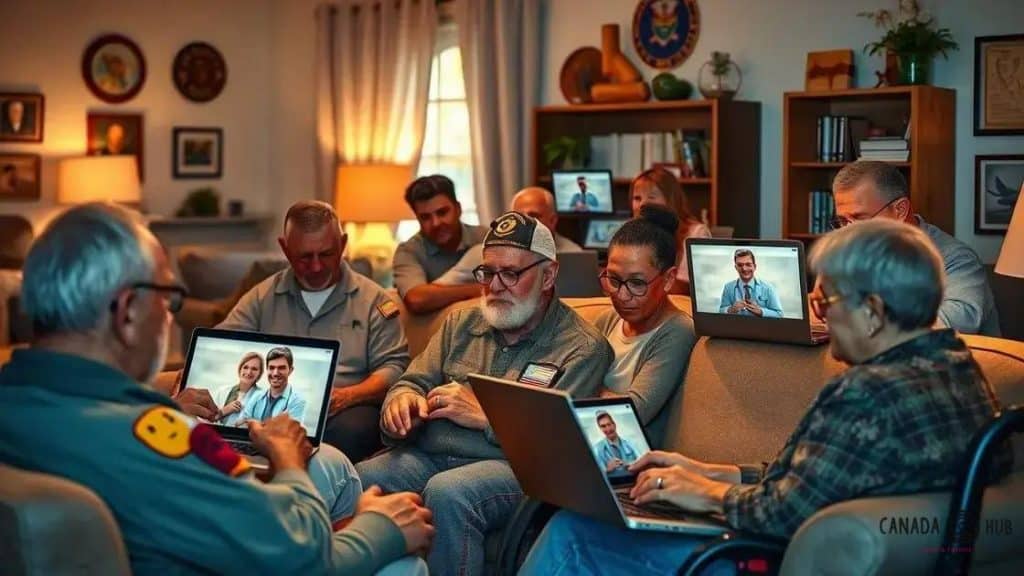Proposed reductions to veterans healthcare benefits spark concern

Proposed reductions to veterans’ healthcare benefits may significantly limit access to necessary medical services, impacting both mental and physical health, highlighting the need for innovative alternatives and community support.
Proposed reductions to veterans’ healthcare benefits have become a hot topic, stirring up emotions and concerns. Have you ever wondered how these changes might affect our veterans? Let’s dive into this critical discussion.
Understanding the proposed reductions
Understanding the proposed reductions to veterans’ healthcare benefits is essential for grasping the full impact of potential changes. These reductions aim to adjust coverage while prioritizing budget constraints. However, many worry about how these decisions affect the veterans who depend on these services.
Key Changes in Coverage
One of the main areas being discussed is the change in eligibility for certain healthcare services. As policies shift, veterans may find themselves facing limitations where they previously had comprehensive support. This could lead to increased out-of-pocket expenses, which many veterans may struggle to afford.
- Reduced access to specialist care
- Changes in mental health service availability
- Increased waiting times for appointments
Moreover, many veterans are concerned about the quality of care they will receive. The proposed reductions raise questions about whether essential treatments will still be covered. With so much at stake, it’s crucial to analyze these proposals carefully.
Impact on Overall Health
Research shows that healthcare access plays a significant role in maintaining veteran health. The proposed reductions could lead to declining physical and mental health among veterans. This reality emphasizes the need for a healthcare system that adequately supports those who have served.
Additionally, when veterans find it challenging to access care, it can lead to a ripple effect impacting their families and communities. Ensuring that veterans receive the care they deserve is a crucial responsibility for society as a whole.
As discussions continue around the proposed reductions, it’s vital to stay informed. Engaging in conversations and advocating for veterans’ needs can help ensure their voices are heard. As a collective, society must prioritize the well-being of its veterans and the services that support their health.
Impact on veterans’ mental health

The impact on veterans’ mental health is a critical aspect to consider when discussing proposed reductions to healthcare benefits. When veterans rely on healthcare services for mental well-being, any changes can have profound effects. Limiting access to care may jeopardize the support they need.
Consequences of Reduced Access
Many veterans struggle with conditions like PTSD, anxiety, and depression. If their access to mental health services is restricted, it can exacerbate these issues. Unmet mental health needs can lead to:
- Increased feelings of isolation
- Higher risk of substance abuse
- Suicidal thoughts and actions
Moreover, when veterans feel abandoned by the system, it damages their trust in healthcare. This lack of faith can deter them from seeking care altogether, creating a cycle of neglect that worsens their mental state. It’s crucial for veterans to have reliable access to mental health resources.
Importance of Support Systems
A strong support system is vital for any veteran navigating mental health challenges. Support does not come solely from healthcare providers; it also stems from family, friends, and community resources. Programs that offer group therapy or peer support are invaluable. Without them, mental health can quickly decline.
As discussions around proposed reductions unfold, the focus must be on safeguarding mental health services. Providing accessible mental health care ensures that veterans receive the kind of comprehensive support they deserve, preserving their well-being and cultivating resilience.
Future of veterans’ healthcare programs
The future of veterans’ healthcare programs is a topic that requires careful consideration. As society continually evolves, so must the systems that support our veterans. These programs are essential not just for medical care but also for the overall well-being of those who served.
Adapting to Emerging Needs
One key aspect of the future is adapting to the changing needs of veterans. With the rise of modern health issues, including mental health concerns and chronic illnesses, programs must evolve. This means expanding services to address:
- Telehealth options for remote consultations
- Integrated mental health services
- Access to complementary therapies
By focusing on these areas, veterans can receive a more holistic approach to their healthcare. This adaptability is crucial for maintaining the quality of care that veterans deserve.
Increased Engagement and Accountability
Another important factor is the need for increased engagement with veterans themselves. Feedback from those who use the programs can guide improvements and ensure the services meet their needs. As transparency and accountability become priorities, veterans will be more likely to trust and utilize these healthcare options.
Innovations in technology can help facilitate this engagement, allowing for easier communication and monitoring of veterans’ healthcare experiences. Utilizing data analytics can shape effective policies and programs tailored to veterans’ specific needs.
The road ahead may be challenging, but with a focus on evolving healthcare programs, it is possible to foster a supportive environment for veterans. Prioritizing their needs ensures a healthier future for those who have given so much for their country.
Alternatives to proposed cuts
Exploring alternatives to proposed cuts in veterans’ healthcare benefits is crucial for ensuring that service members receive the necessary support. There are various innovative strategies that can be implemented to protect healthcare services while addressing budgetary concerns.
Expanding Preventive Care
One alternative is to invest in preventive care measures. By focusing on prevention, the overall need for more expensive treatments can be reduced. Here are some key advantages of emphasizing preventive care:
- Improved health outcomes for veterans
- Reduced long-term healthcare costs
- Higher quality of life for individuals
By incorporating regular health screenings and wellness programs, veterans can manage their health effectively, which might reduce the demand for intensive medical interventions in the future.
Leveraging Technology
Another option is leveraging technology to provide efficient and effective healthcare services. Telehealth, for example, allows veterans to access care remotely. This can include:
- Virtual consultations with healthcare providers
- Online mental health support
- Remote monitoring for chronic conditions
Utilizing technology not only makes healthcare more accessible but also helps to maintain continuity of care, ensuring that veterans do not fall through the cracks.
Furthermore, the collaboration with community organizations can enhance service delivery. These partnerships can provide additional resources and support systems. By working together, the community can fill gaps in service that might arise due to proposed cuts.
Focusing on these alternatives may not only safeguard veterans’ rights to essential healthcare but also pave the way for a more sustainable system that supports their ongoing needs.
Voices of veterans: Their perspective
The voices of veterans are crucial in understanding the impacts of proposed changes to their healthcare benefits. Listening to their experiences provides valuable insights into how policies affect real lives. Their perspectives can illuminate the broader implications of healthcare services.
Personal Stories Matter
Every veteran has a unique story shaped by their service. Many express concern over the potential cuts in healthcare access. These changes can lead to feelings of uncertainty and anxiety. Veterans often mention challenges they face in receiving timely care, which can worsen their overall health.
- Struggles with accessing specialized care
- Concerns about mental health support
- Worries over increased medical costs
Sharing these stories helps raise awareness about the importance of comprehensive healthcare for veterans. By hearing directly from those affected, policymakers can better understand the realities on the ground.
Community Support and Advocacy
Veterans also emphasize the necessity of community support. Many find solace in peer groups and advocacy organizations that understand their challenges. These communities foster a sense of belonging and empowerment. In their voices, they highlight the need for:
- Access to group therapy sessions
- Opportunities for advocacy and participation in decision-making
- Educational resources about available benefits
When veterans are empowered to speak out, they collectively create a stronger voice that can influence changes in policy, ensuring their needs are met. Listening to the voices of veterans not only honors their service but also guides necessary reforms in healthcare.
In conclusion, it’s essential to recognize the impact of proposed reductions to veterans’ healthcare benefits. These changes can significantly affect the lives of those who served our country. By listening to the voices of veterans, supporting innovative alternatives, and prioritizing mental health, we can work together towards a more sustainable and effective healthcare system for our veterans. Their well-being matters, and as a society, we must ensure that they receive the care and support they deserve.
FAQ – Frequently Asked Questions about Veterans’ Healthcare Benefits
What are the proposed reductions to veterans’ healthcare benefits?
The proposed reductions aim to cut certain services and benefits, potentially limiting access to essential healthcare for veterans.
How can community support impact veterans’ healthcare?
Community support can provide resources, enhance emotional well-being, and foster a sense of belonging among veterans, which is crucial for their health.
What alternatives exist to address the proposed cuts?
Alternatives include investing in preventive care, leveraging technology like telehealth, and increasing engagement with veterans for better service delivery.
Why is listening to veterans’ voices important?
Hearing veterans’ experiences is vital for understanding the real impacts of healthcare policies and shaping reforms that meet their needs.





